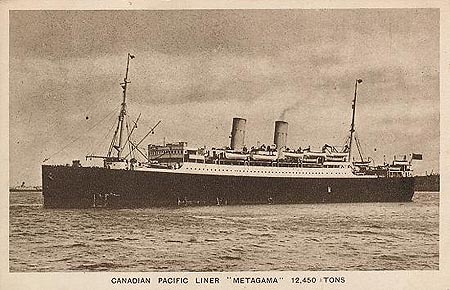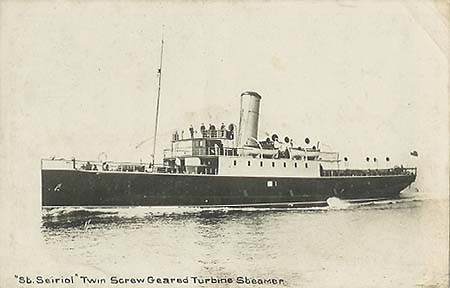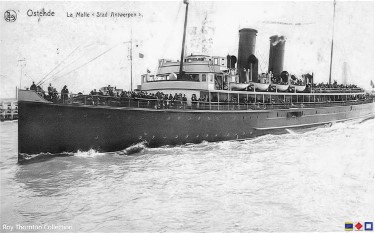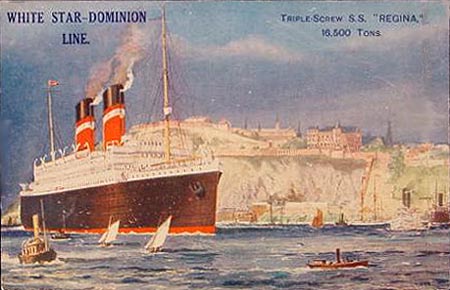|
Aug 14, 1895
|
Born in Pembroke, Ontario to
Thomas Robertson and Eliza Ann (nee Drynan) Horn
|
|
Nov 6, 1914
|
Attested into the 21st Battalion in
Kingston, Ontario
Ø Number 59481 (temporary number 436)
Ø Next of kin given as Miss Myrtle Horn, sister,
Pembroke, Ontario
Ø Previous occupation given as Railroad Porter
Ø No previous military experience given
Ø Religion given as Presbyterian
Ø Posted to “D” Company
o
This was later
reorganized into “B” Company
The 21st Battalion trained in the
Kingston, Ontario area through the winter of 1914-15.
|
|
Jan 1, 1915
|
Admitted to Kingston hospital with a diagnosis
that reads Bronchitis
|
|
May 6, 1915
|
Embarked the RMS Metagama in
Montreal, Quebec

|
|
May 15, 1915
|
Disembarked in Devonport,
England and the battalion proceeded to the West Sandling Camp, near Hythe,
Kent to continue training
|
|
Sep 14, 1915
|
Embarked the St. Seiriol in
Folkestone

|
|
Sep 15, 1915
|
Disembarked in Boulogne,
France and the battalion proceeded to St. Omer
|
|
Mar 8, 1916
|
Employed as a “B” Company
Batman to a platoon commander
|
|
Jul 7, 1916
|
Admitted to the No. 4 CFA
(Canadian Field Ambulance) with a diagnosis that reads Infected right ear
lobe and Cervical Adenitis (a lymph node infection). He was transferred the same day to the No.
2 Division Rest Station at the No. 5 Canadian Field Ambulance
|
|
Jul 10, 1916
|
Discharged to duty from the
rest station
|
|
Jul 31, 1916
|
Attached to the 4th
Canadian Trench Mortar Battery for duty
|
|
Aug 13, 1916
|
While in the front line
trenches near Voormezeele, Belgium, Private Horn received shrapnel wounds to
his lower legs and was evacuated to the No. 4 Canadian Field Ambulance for
first aid before being transported to the No. 6 Canadian Field Ambulance
|
|
Aug 16, 1916
|
Transferred to the No. 2
Division Rest Station at the No. 5 Canadian Field Ambulance
|
|
Aug 21, 1916
|
Discharged to duty and
rejoined the trench mortar battery
|
|
Sep 23, 1916
|
Admitted to the No. 8 Canadian
Field Ambulance with a diagnosis that reads Calloused feet
|
|
Sep 29, 1916
|
Discharged to duty and
rejoined the trench mortar battery
|
|
Nov 6, 1916
|
Awarded the Good Conduct Badge
|
|
Dec 22, 1916
|
Granted 10 days leave
|
|
Jan 4, 1917
|
Rejoined the trench mortar
battery from leave
|
|
Mar 26, 1917
|
Admitted to the 2/1st
West Riding British Casualty Clearing Station with a diagnosis that reads PUO
(Pyrexia of Unknown Origin), a fever without a known cause, often referred to
as Trench Fever
|
|
Apr 4, 1917
|
Transferred via No. 14 AT
(Ambulance Train) and admitted to the No. 24 General Hospital in Etaples,
France
|
|
Apr 10, 1917
|
Invalided to England aboard
the Hospital Ship Stad Antwerpen

On arrival in England he was
admitted to the Essex County War Hospital in Colchester
Transferred to the EORD
(Eastern Ontario Regimental Depot) for pay purposes while in hospital
|
|
Apr 30, 1917
|
Transferred to the Canadian
Convalescent Hospital in Woodcote Park, Epsom
|
|
Jun 18, 1917
|
Attached to the 3rd
CCD (Canadian Command Depot) for Physical Training
|
|
Oct 4, 1917
|
Discharged from hospital care
and transferred to the 6th Reserve Battalion in Seaford
|
|
Dec 3, 1918
|
Transferred to #7 Wing, Kinmel
Park pending return to Canada
|
|
Dec 12, 1918
|
Embarked the SS Regina in
Liverpool

|
|
Dec 20, 1918
|
Disembarked in Halifax, Nova
Scotia and proceeded to Kingston, Ontario where he was Taken On Strength the
Casualty Company, Military District #3
|
|
Dec 24, 1918
|
Granted leave until January 6,
1919
|
|
Jan 14, 1919
|
Discharged from the CEF in
Kingston, Ontario
Ø Rank on discharge
Private
Ø Entitled to War
Service Badge Class “A”
Ø Proposed residence
on discharge Pembroke, Ontario
Following his discharge, the
1914-15 Star, British War Medal and Victory Medals were sent to him at 160
Herkimer St., Hamilton, Ontario
|
|
Mar 19, 1920
|
Married to Mary Catherine
Gladis Dazé in Ottawa, Ontario
His occupation was noted as
Multigraph Operator and his religion was noted as Church of England
|
|